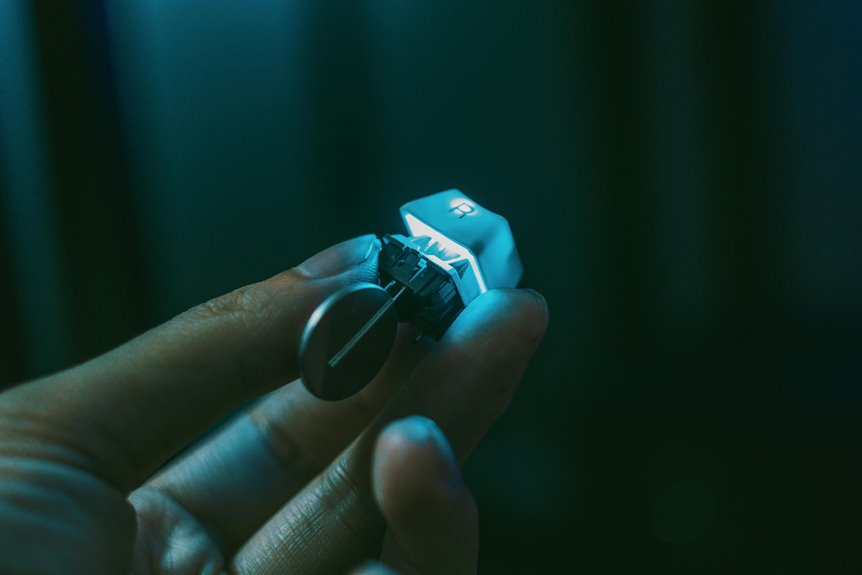When choosing a mechanical keyboard, understanding the lifespan of its switches is crucial. You'll find that different brands offer varying durability, which can significantly impact your typing experience. Factors like materials and your own typing habits also play a role in switch longevity. So, how do you ensure you select the right switch for your needs? Let's explore the types of switches and what to expect from their performance over time.
Table of Contents
Key Takeaways
- Cherry MX switches have a lifespan of approximately 50 million keystrokes, while Razer switches can last around 80 million keystrokes, offering high durability.
- Kailh switches also typically have a lifespan of about 50 million keystrokes, making them comparable to Cherry MX in longevity.
- Durability is influenced by material quality, design, and environmental factors like dust and moisture exposure.
- Typing habits, including speed and force, can significantly impact the longevity of mechanical switches.
- Over time, actuation force and tactile feedback may change, affecting the overall typing experience and performance.
Types of Mechanical Switches
When you dive into the world of mechanical keyboards, you'll quickly discover that not all switches are created equal.
You'll encounter three main types: linear, tactile, and clicky. Linear switches offer a smooth keystroke without any feedback, making them perfect for gaming. Tactile switches provide a noticeable bump when actuated, giving you a satisfying feel without the loud noise—great for typing.
Clicky switches, on the other hand, deliver both tactile feedback and an audible click, which many typists love for its satisfying sound. Each type has its unique advantages, so consider your preferences and usage when choosing.
Ultimately, the right switch can enhance your typing experience and performance, making it essential to explore these options carefully.
Expected Lifespan of Different Switches
Each type of mechanical switch not only offers a unique typing experience but also comes with its own expected lifespan.
Understanding these lifespans can help you choose the right switch for your needs.
Here's a quick breakdown of the expected lifespans for common switch types:
- Cherry MX switches: These are designed to last around 50 million keystrokes, making them a popular choice for durability and reliability.
- Razer switches: Typically rated for about 80 million keystrokes, Razer switches combine performance with longevity.
- Kailh switches: These often have a lifespan of around 50 million keystrokes, offering a balance between cost and durability.
Knowing these lifespans will guide you in selecting the switch that best fits your typing habits and preferences.
Factors Impacting Switch Durability
While you might think that all mechanical switches are created equal, several factors significantly impact their durability and overall lifespan.
First, the material used in the switch housing and components plays a crucial role; high-quality plastics or metals can withstand wear better than cheaper alternatives.
Next, the design of the switch, including the spring mechanism, affects how it handles repeated use. A well-engineered spring can provide consistent feedback and resist fatigue over time.
Additionally, the environment where you use your keyboard matters; dust, moisture, and temperature fluctuations can degrade switch performance.
Finally, your typing habits, such as speed and force, can influence how long a switch lasts.
Performance Over Time: What to Expect
Over time, you can expect mechanical keyboard switches to exhibit varying levels of performance based on their design and usage.
Here are three key aspects to keep in mind:
- Actuation Force: As switches age, the actuation force may change slightly, affecting your typing experience. You might notice that some keys feel lighter or stiffer than when they were new.
- Tactile Feedback: Depending on the switch type, tactile feedback can diminish over time. You may find that the distinct "bump" in tactile switches becomes less pronounced.
- Sound Profile: Many switches will become quieter or louder as they wear. This change can impact your overall typing experience, especially in shared environments.
Keeping these factors in mind can help you better understand how your keyboard will perform in the long run.
Choosing the Right Switch for Your Needs
How can you find the perfect mechanical switch for your typing style and preferences? Start by considering your primary use—gaming, typing, or a mix of both. Different switches cater to different needs, so it's crucial to identify what feels best for you. Below is a quick comparison of common switch types:
| Switch Type | Actuation Force | Sound Level |
|---|---|---|
| Cherry MX Red | 45g | Quiet |
| Cherry MX Blue | 50g | Clicky |
| Cherry MX Brown | 45g | Tactile, moderate |
| Gateron Yellow | 50g | Quiet |
| Kailh Box White | 50g | Clicky |
Experiment with various switches in-store or through a switch tester to find your ideal match. Your comfort matters!
Frequently Asked Questions
Can Mechanical Switches Be Repaired if They Break?
Yes, mechanical switches can be repaired if they break. You can often replace individual components like springs or stems. However, if the damage is extensive, it might be more practical to replace the entire switch.
How Do I Clean My Mechanical Keyboard Switches?
To clean your mechanical keyboard switches, first unplug it. Remove keycaps carefully, then use compressed air to blow out debris. Wipe the switches with a damp cloth, ensuring no moisture gets inside. Reassemble when dry.
What Materials Are Used in Mechanical Switches?
Mechanical switches typically use materials like plastic for the housing, metal for the contacts, and rubber or silicone for dampening. These components work together to provide a responsive typing experience you'll appreciate during use.
Do Mechanical Switches Require Lubrication?
Yes, mechanical switches can benefit from lubrication. It reduces friction, enhances smoothness, and minimizes noise. If you decide to lubricate, make sure to use the right type and apply it carefully for optimal performance.
Are There Any Health Concerns With Mechanical Keyboards?
Yes, there can be health concerns with mechanical keyboards. You might experience repetitive strain injuries from prolonged use or poor posture. Ensuring ergonomic setup and taking breaks can help prevent these issues and keep you comfortable.




